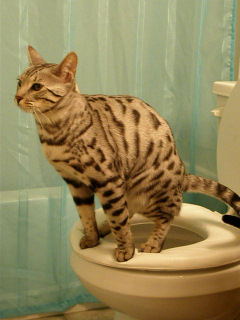Why You Should Avoid Flush Cat Poop Down Your Toilet - Important Information
Why You Should Avoid Flush Cat Poop Down Your Toilet - Important Information
Blog Article
Just about every person maintains his or her own thinking when it comes to How to Dispose of Cat Poop and Litter Without Plastic Bags.

Intro
As cat proprietors, it's vital to bear in mind just how we dispose of our feline good friends' waste. While it may seem practical to purge cat poop down the toilet, this method can have detrimental effects for both the setting and human health and wellness.
Environmental Impact
Purging feline poop presents dangerous pathogens and parasites into the water supply, presenting a significant threat to water communities. These impurities can negatively impact marine life and compromise water top quality.
Health Risks
Along with ecological problems, flushing pet cat waste can additionally present health and wellness risks to human beings. Cat feces may have Toxoplasma gondii, a parasite that can trigger toxoplasmosis-- a possibly serious disease, particularly for pregnant ladies and individuals with weakened body immune systems.
Alternatives to Flushing
Fortunately, there are more secure and a lot more liable means to throw away cat poop. Think about the adhering to alternatives:
1. Scoop and Dispose in Trash
One of the most common technique of throwing away pet cat poop is to scoop it into a biodegradable bag and toss it in the garbage. Be sure to use a committed litter scoop and throw away the waste without delay.
2. Usage Biodegradable Litter
Go with eco-friendly pet cat litter made from materials such as corn or wheat. These trashes are environmentally friendly and can be securely thrown away in the trash.
3. Hide in the Yard
If you have a lawn, consider burying feline waste in a designated area far from veggie gardens and water sources. Make sure to dig deep enough to stop contamination of groundwater.
4. Install a Pet Waste Disposal System
Invest in an animal garbage disposal system particularly designed for pet cat waste. These systems make use of enzymes to break down the waste, reducing smell and ecological effect.
Verdict
Responsible family pet possession expands beyond supplying food and sanctuary-- it likewise entails proper waste monitoring. By avoiding flushing feline poop down the commode and opting for alternative disposal techniques, we can decrease our ecological impact and shield human health and wellness.
Why You Should Never Flush Cat Poop Down the Toilet
A rose by any other name might smell as sweet, but not all poop is created equal. Toilets, and our sewage systems, are designed for human excrement, not animal waste. It might seem like it couldn’t hurt to toss cat feces into the loo, but it’s not a good idea to flush cat poop in the toilet.
First and foremost, assuming your cat uses a litter box, any waste is going to have litter on it. And even the smallest amount of litter can wreak havoc on plumbing.
Over time, small amounts build up, filling up your septic system. Most litter sold today is clumping; it is made from a type of clay that hardens when it gets wet. Ever tried to scrape old clumps from the bottom of a litter box? You know just how cement-hard it can get!
Now imagine just a small clump of that stuck in your pipes. A simple de-clogger like Drano isn’t going to cut it. And that means it’s going to cost you big time to fix it.
Parasitic Contamination
Believe it or not, your healthy kitty may be harboring a nasty parasite. Only cats excrete Toxoplasma in their feces. Yet it rarely causes serious health issues in the cats that are infected. Most people will be fine too if infected. Only pregnant women and people with compromised immune systems are at risk. (If you’ve ever heard how women who are expecting are excused from litter cleaning duty, Toxoplasma is why.)
But other animals may have a problem if infected with the parasite. And human water treatment systems aren’t designed to handle it. As a result, the systems don’t remove the parasite before discharging wastewater into local waterways. Fish, shellfish, and other marine life — otters in particular — are susceptible to toxoplasma. If exposed, most will end up with brain damage and many will die.
Depending on the species of fish, they may end up on someone’s fish hook and, ultimately on someone’s dinner plate. If that someone has a chronic illness, they’re at risk.
Skip the Toilet Training
We know there are folks out there who like to toilet train their cats. And we give them props, it takes a lot of work. But thanks to the toxoplasma, it’s not a good idea.

I was guided to that article on Can You Flush Cat Poo or Litter Down the Toilet? from a friend on a different website. Are you aware of another individual who is in to the topic? Do not hesitate to share it. Thanks a bunch for your time. Visit again soon.
Get A Free Quote Report this page